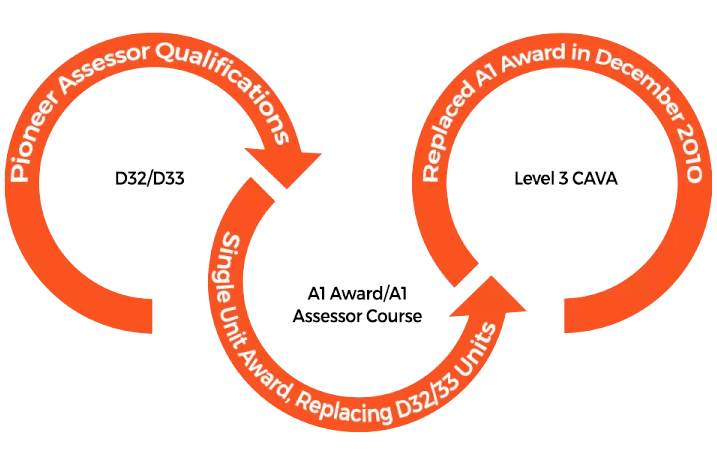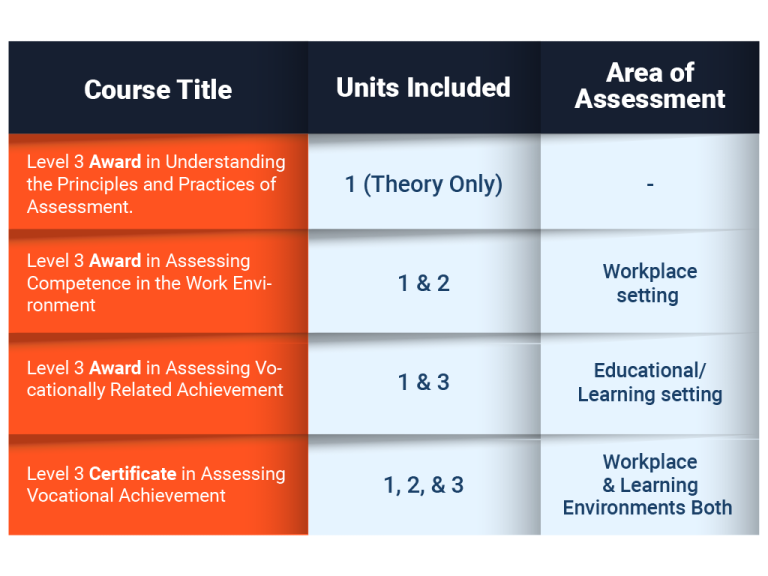Starting a job as an assessor is a strategic step that can considerably improve your educational and training capabilities. However, it is often that beginners get confused about the basic concepts, especially when it comes to the terminology of this qualification range. For instance, thinking that TAQA is CAVA and vice versa, and since it is important to have a good understanding of the basics first, this blog will provide answers to frequently asked questions, such as, ‘What does TAQA stand for?’ ‘What are assessor qualifications?’ ‘Is TAQA and CAVA the same thing?’

What is TAQA?
TAQA is commonly misunderstood either as a qualification itself or a qualification similar to or interchangeable with CAVA. But neither of these is the case. TAQA is basically an umbrella term that stands for Training, Assessment and Quality Assurance, and is used to refer to a range of qualifications related to assessment and quality assurance.
Core Components of TAQA Qualifications
Assessment component focuses on the skills and knowledge needed for effective assessment methods, ensuring that learners are assessed accurately and fairly in compliance with industry standards. Professionals with TAQA qualifications usually assess learners’ competency and performance in a variety of vocational settings.
How TAQA is Different from CAVA?
As mentioned above, TAQA is a suite of different qualifications, meaning it is not a qualification itself but the aspects within are. The biggest difference between TAQA and CAVA is that one is a qualification and the other is not. Level 3 Certificate in Assessing Vocational Achievement (L3 CAVA) is one of the assessor qualifications included in the range of qualifications that TAQA has to offer.

Exploring TAQA Qualifications: Including all Levels
Here are some major qualifications that come under the ambit of TAQA:
Level 3 Assessor Qualifications include:
- Level 3 Award in Understanding the Principles and Practices of Assessment
- Level 3 Award in Assessing Competence in the Work Environment
- Level 3 Award in Assessing Vocationally Related Achievement
- Level 3 Certificate in Assessing Vocational Achievement
Level 4 IQA Qualifications include:
- Level 4 Award in Understanding the Internal Quality Assurance of Assessment Processes and Practice
- Level 4 Award in the Internal Quality Assurance of Assessment Processes and Practice
- Level 4 Certificate in Leading the Internal Quality Assurance of Assessment Processes and Practice
Level 4 EQA Qualifications include:
- Level 4 Award in Understanding the External Quality Assurance of Assessment Processes and Practice
- Level 4 Award in the External Quality Assurance of Assessment Processes and Practice
Levels and Specialisations within TAQA
The Level 3 assessor qualifications help you become a qualified assessor; the units included in these courses are both competence and knowledge-based which will allow you to assess within and outside of the workplace depending on the course you choose. Moreover, you have the option to enrol on the Level 3 Certificate in Assessing Vocational Achievement – an allrounder qualification that includes all assessor levels.
To learn more about the Assessor qualifications, click here
On the other hand, Level 4 qualifications can help you understand how the quality assurance is performed in an assessment process. Essentially there are two categories of quality assurance i.e. internal and external. The internal quality assurance process is part of centres and institutes where assessment of qualification and vocational courses is taking place. While the external quality assurance is performed by awarding body officials, to make sure that a smooth and unbiased system of internal quality assurance and assessment is in place at the centres.
Industry Recognition and Importance of TAQA Qualification
One of the biggest benefits of achieving any of the TAQA Qualifications is that they are applicable to all higher educational sectors in the UK. Meaning that when you achieve a qualification, be it a Level 3 CAVA or a Level 4 IQA you will attract numerous employment opportunities across all industries.
Understanding Assessor Qualifications and Why They Stand Out
Previously known as D32/33 and then as A1 Assessor course, these level 3 qualifications cover topics like principles and practices of assessment, what are the techniques, tools, techniques, and methods for effective assessment, and how to assess learners while also providing them with proper feedback.
There are multiple routes to becoming a qualified assessor which is through three level 3 qualifications under TAQA. But first, you may want to ask yourself a question i.e., where do I want to assess learners? Do you want to assess them in a learning environment which may be an educational setting or at a workplace? Or both? Answering this question will make it easier to choose the relevant qualification.
For instance, if you want to assess learners at a workplace the most suitable qualification is Level 3 Award in Assessing Competence in the Work Environment. On the contrary, if you wish to assess them in a learning/training environment then you should choose Level 3 Award in Assessing Vocationally Related Achievement.
Now you may say, ‘what if I want to assess them in both settings?’Then Level 3 Certificate in Assessing Vocational Achievement (CAVA) is the ideal option because it includes all assessor levels.
To learn more on how to choose the right assessor course, click here

Under TAQA, Level 3 CAVA is one of the most taken courses by learners. But what exactly makes this qualification so popular among all the TAQA courses, is not a mystery. Here are some key reasons:
- Level 3 CAVA is an entry-level qualification for persons interested in becoming qualified vocational assessors. It is appropriate for people new to assessment practices and provides an overview of the fundamental ideas and requirements.
- CAVA course is adaptable and suitable for a wide range of occupational fields. It is not sector-specific, making it applicable to assessors working in a variety of sectors and specialties.
- It is widely recognised and accepted in the education and training sectors. Many employers and training providers respect this degree because it demonstrates that the assessor has met industry standards.
- L3 CAVA qualification is intended to be practical and hands-on, emphasising the skills and information required for effective evaluation. This makes it a practical option for people who wish to utilise their knowledge immediately in their jobs.
- Level 3 CAVA can also be used as a stepping stone for assessors looking to advance their professions or obtain higher-level credentials.
- The Level 3 CAVA qualification is in line with the regulatory criteria for assessors in many educational and vocational settings, making it the go-to solution for individuals looking to meet industry standards.
Want to learn about the responsibilities of a qualified Assessor? click here
Assessor Qualifications: Level 3 dividends of CAVA
The easy and smooth structure of this Level 3 CAVA qualification is also one of the reasons that makes it the most in-demand course. Below are the basic units included and the structure of how they are arranged in each assessor qualification:
Unit 1: Understanding the Principles and Practices of Assessment
Unit 2: Assess Occupational Competence in the Work Environment
Unit 3: Assess Vocational Skills, Knowledge and Understanding

This demonstrates that CAVA is a perfect balance of theoretical knowledge and practical application. This is why it is the most sought-after qualification in the TAQA suite and, hence the most valuable one.
Final Thoughts
TAQA qualifications have a significant impact on professional development, particularly in education and training. Individuals who hold TAQA qualifications, such as the Level 3 Certificate in Assessing Vocational Achievement (CAVA), receive essential experience in training, assessment, and quality assurance. These qualifications improve employability, allowing you to work as an assessor, internal or external quality assurance expert, or training expert. Whether starting as an entry-level assessor or progressing to higher credentials, TAQA acts as a catalyst for persons seeking exciting and fulfilling career pathways in the evolving world of vocational education and training.
Related Products
-
Focus Awards Level 3 Award in Assessing Competence in the Work Environment (RQF)
Rated 5.00 out of 5£45.77 – £240.00 Select options -
Focus Awards Level 3 Award in Assessing Vocationally Related Achievement (RQF)
Rated 5.00 out of 5£45.77 – £240.00 Select options -
Focus Awards Level 3 Certificate in Assessing Vocational Achievement (RQF)
Rated 4.90 out of 5£64.17 – £340.00 Select options



